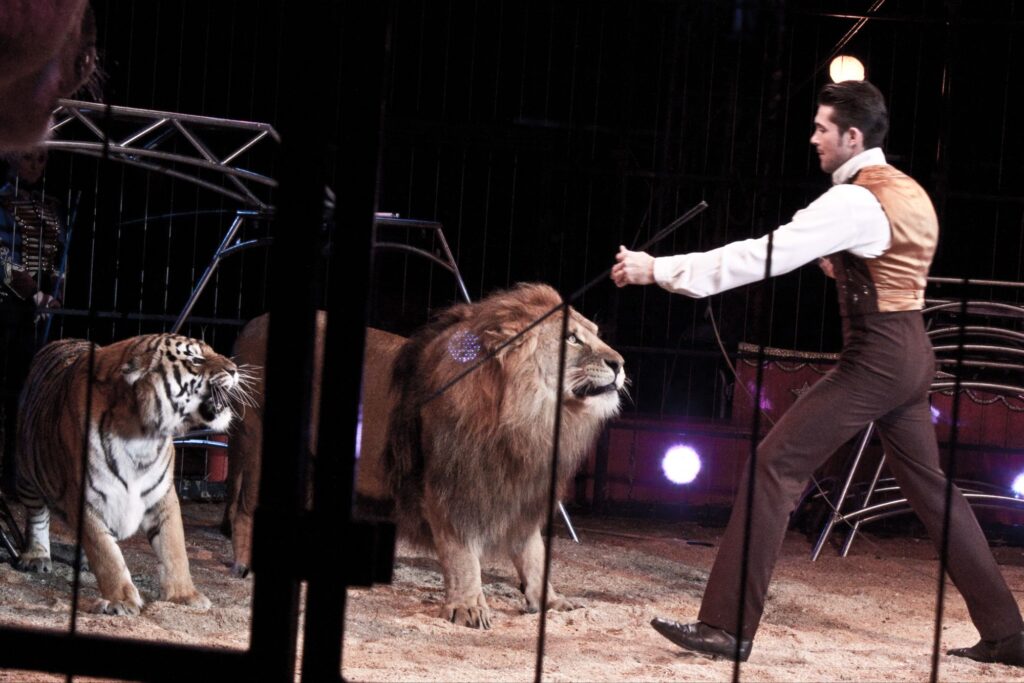
Tragic events at Egypt’s Flip Circus and various zoos have pulled back the curtain on the cruelty behind animal performances. In March 2025, a horrific tiger attack in Tanta led to the amputation of a circus worker’s arm. Just weeks earlier, a starving lion fatally mauled a zookeeper at the Fayoum Zoo, prompting security officers to shoot the lion dead.
These gruesome incidents aren’t isolated. Animal rights advocates in Egypt have documented systemic abuse in circus environments—ranging from physical beatings to starvation tactics used during training. The public responded with outrage. The hashtag campaign “#Together_to_boycott_the_circus” gained massive traction, calling for a complete ban on animal-based performances. Many look to European nations like Austria, Belgium, and Finland, which have already outlawed wild animal shows, as a model for reform.
Behind the Curtain: Cruelty and Control in Circus Training
The Tanta tiger attack revealed not only the dangers of using wild animals for entertainment but also the disturbing tools handlers rely on. During a rescue attempt, a worker stabbed the tiger with a metal “training fork,” exposing the brutal instruments used to keep animals submissive.
The injured worker, Mohamed El-Bastawisi, criticized the circus trainer for failing to use her emergency firearm—another grim reminder that deadly force is part of the standard protocol at these shows.
Mona Khalil, head of the Egyptian Society for Mercy to Animals, condemned the torture animals endure just to perform a single trick. She listed electric prods, food deprivation, and constant confinement in iron cages among the horrific methods trainers use to break their spirit.
Backstage footage and investigations painted an even darker picture: elephants jabbed with hooks disguised in decorative tassels, horses suffering from “dancing bits” that slice their tongues, and lions forced into performance rings by broom handles poked through their cages.
A recent video even captured what looked like a drugged and scarred lion at Flip Circus—further highlighting the extent of abuse that remains hidden from audiences.
Public Fury Mounts as Protesters Target Flip Circus
The recent tiger attack ignited widespread protests across Egypt. Thousands gathered outside Flip Circus’s venue in Tanta, demanding a total ban on animal shows. A petition to shut down animal circuses quickly collected over 50,000 signatures. Authorities have since suspended the circus while investigations are underway.
Animal rights groups now stage regular demonstrations outside Flip Circus locations, displaying graphic images of abused animals—some showing baby elephants violently slammed to the ground and jabbed with bull hooks. These efforts often lead to tense confrontations with families visiting the circus.
Protest organizer statements reflected the urgency: “If people knew the brutal process behind these performances, they wouldn’t step foot in the tent.”
Social media played a key role in fueling the boycott. Activists targeted not just Flip Circus, but also its sponsors. This strategy echoes recent Egyptian boycott movements that successfully boosted local businesses by nearly 50%.
Prominent Egyptian actors like Khaled Abol Naga and Amr Waked have joined the cause, lending celebrity power to the protests. Waked emphasized the importance of public pressure through demonstrations and strikes.
Legislators Take Action: Proposed Ban Gains Momentum
The mounting pressure prompted the Egyptian Parliament to consider historic legislation that could outlaw animal performances nationwide. MP Ayat Al-Haddad submitted a proposal to ban circuses from using or importing predatory animals. The draft includes stiff penalties and closures for violators.
Meanwhile, the Agriculture and Irrigation Committee backed a broader law regulating dangerous animal ownership. Though detailed articles are still under discussion, the draft would restrict individuals from breeding or keeping such animals—allowing exceptions only for licensed zoos and scientific institutions.
The push aligns with Egypt’s existing Law No. 29 of 2023, though some lawmakers criticized the government’s slow implementation. MP Zaki Abbas called for a thorough investigation into circus practices, warning that the documented abuse is “just the tip of the iceberg.”
Egypt would be joining a growing list of countries—like Bolivia, Belgium, and Austria—that have already banned wild animal performances. Other nations, including Brazil and Chile, are weighing similar legislation.
Beyond ethical concerns, shifting to human-only shows could have financial benefits. Experts estimate that ticket prices for animal-free performances range from $25 to $300—higher than the $14 to $100 typical for animal shows. The transition could also generate more employment opportunities within the entertainment industry.
Activist Dina Zulfikar is pushing for a complete ban on using any animal, wild or domestic, in performances. She also advocates for creating sanctuaries to protect endangered species in Egypt.
The World Animal Protection organization urged the Egyptian government to prohibit any entertainment activity involving animal suffering, calling for a blanket ban on circus animal use.
Conclusion: A Turning Point in Egyptian Entertainment
The violent incidents at Egyptian circuses have catalyzed a powerful movement against animal exploitation. Exposed training methods, tragic deaths, and massive public protests have pressured lawmakers to reimagine the future of live entertainment.
With strong legislation under debate and growing public awareness, Egypt stands on the edge of major reform. A shift toward cruelty-free, human-only performances may not only protect animals but also revitalize the industry economically and artistically.
As voices rise across the country—from activists to celebrities to concerned citizens—the message is clear: the era of animal circuses in Egypt is coming to an end.